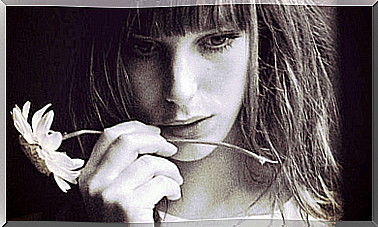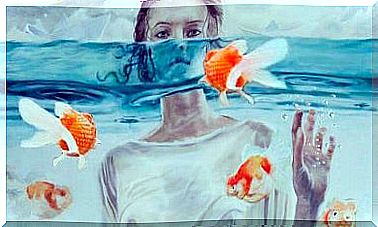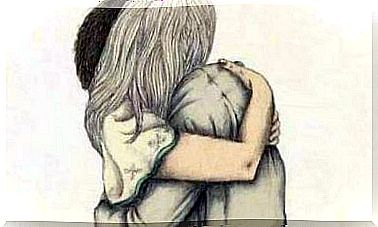Pathological Distance Between Who We Are And How We Show Ourselves
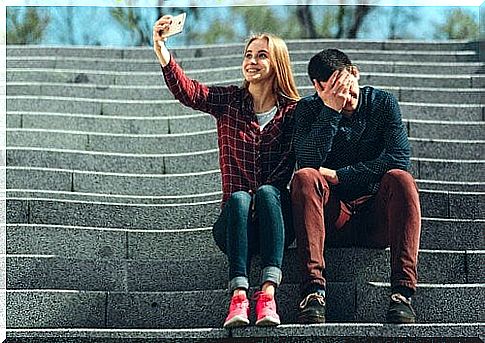
Social networks can embody that pathological distance between who we are and what we show to the world, as they feed our anxiety. Thanks to them, we have the possibility of receiving almost immediate reinforcements. In short, a quick but effective dose of dopamine. Like any short-term pleasure, the dosage must be repeated often to be satisfactory; aspect that turns into a real problem.
Social networks mirror ourselves every time we share content. In return, we have to endure invisible pressure so that this reflection is always new and interesting. Furthermore, our desire for approval pushes us to avoid showing our less pleasant or boring side.
On the one hand, we have an imaginary audience, from which we seek approval ; on the other, a reality that needs to be built. This should lead us to ask ourselves: how does all this push us to invent virtual reality? To what extent can the different emotional value between what we feel and what we show affect us?

A real danger: pathological distance on social networks between what we feel and what we decide to show
In today’s world, many of us rely on social platforms, such as Facebook, Twitter, Snapchat, YouTube, Instagram, or Tik Tok to make social connections. While each is beneficial in its own way, it is important to keep in mind that social networks can never replace the human connection inherent in the real world.
We need personal contact to secrete the hormones that release stress and make us feel happier, healthier and more optimistic. Spending too much time interacting on social networks can exacerbate psychological disorders, such as anxiety and depression. Social networks can foster negative experiences such as:
- Dissatisfaction with one’s life or one’s appearance: while aware that the images we are scrolling through are changed, they can make us feel insecure.
- Fear of being left out (FOMO): Although it is a recognized syndrome long before social networks existed, sites like Facebook and Instagram seem to heighten the feeling that others are having more fun than us or that they are living better. This can undermine self-esteem, cause anxiety and push us to further increase the use of social networks.
But they are also the cause of …
- Isolation: A University of Pennsylvania study revealed that using too much Facebook, Snapchat and Instagram increases the sense of loneliness. It also revealed that reducing its use can make us feel less lonely and isolated, resulting in an increase in general well-being.
- Anxiety and Depression : Let’s enjoy eye contact. Nothing lowers stress levels and improves our mood like looking someone who cares in the eye.
- Cyberbullying: About 10% of teenagers admit to having been intimidated through social networks and many other users are victims of offensive comments.
- Self- centeredness: Sharing selfies or private thoughts on social networks can fuel an unhealthy self-centeredness and distance us from contacts that are part of real life.
Pathological distance on social media can be a cause for anxiety
Using social networks can be a problem when it reduces the quality or frequency of face-to-face interactions, distracts from work, or makes you sad or envious. At the same time, if we use social networks to make others jealous or annoy, perhaps it is time to rethink how we use them.
One of the most worrying aspects is not the pace at which we publish, but the honesty with which we share such content. Because, yes, posting photos in which we look happy while in reality we are sad can fuel our anxiety.
Are we obliged to publish on social networks?
Most of us have a small and loyal audience on our social media profiles. Certainly not even 10% of our contacts correspond to people with whom we have a deeper relationship. On top of that, social networks usually don’t offer us help or money if we’re not influencers.
At the most we will have the satisfaction of being able to share information and content on some topics. Very often the impact of our content on social networks depends more on the attitude of our friends or followers towards us than on the message itself or the world in which it was exposed.
In essence, social networks are a showcase to showcase our best profile, whether it is professional or private. Nonetheless, they are rarely a source of long-term well-being.
Sometimes, indeed, it may happen that we feel the pressure of having to publish a content, as if we had before us an invisible being to feed. This pressure can become a big problem when it causes anxiety.
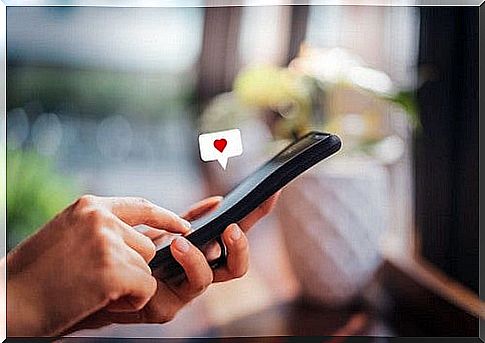
An example of pathological distance: the wedding day
Let’s say someone is waiting for their wedding day. Imagine being able to share the photos of that day, but the unexpected multiplies. It is too hot, discussions arise with the partner during the ceremony and the protagonist of our story accuses terrible pain in his back.
He is undoubtedly happy at heart, but that day is not what he expected. The idea of sharing a photo on his social profile doesn’t appeal to him, but he feels that if he doesn’t do it soon people will start asking questions and he himself will feel uncomfortable. Here at the end he publishes a photo of the day “to get by”.
It seems a very theoretical situation, but it really happens, in the most disparate ways, every day. We publish an image that should reflect an emotional state that is not the one experienced. Is this the kind of life we want to lead?
It is also easy to provoke rejection and even a lack of trust by showing us on social media as people who are far from our true selves. Not even the so-called influencers are exempt from this suspicion from the people who follow them, although they justify it as “it’s a way to earn a living”.
Concluding reflections: the pathological distance on social media
Showing that there is a clear difference between what we really feel and what we show can cause psychological distress and a certain distrust of others. It also favors a sort of pathology in the affective, cognitive and behavioral sphere that could have long-term consequences.
The point is not to abandon social networks, but it is right to reflect on what they offer us, on how much time we invest in their use and if instead of doing us well they cause problems of anxiety and self-esteem.
If they have come to stay, do not forget that learning from them and from ourselves is a journey in perpetual motion. You are free to stop showing what does not represent you in reality.
